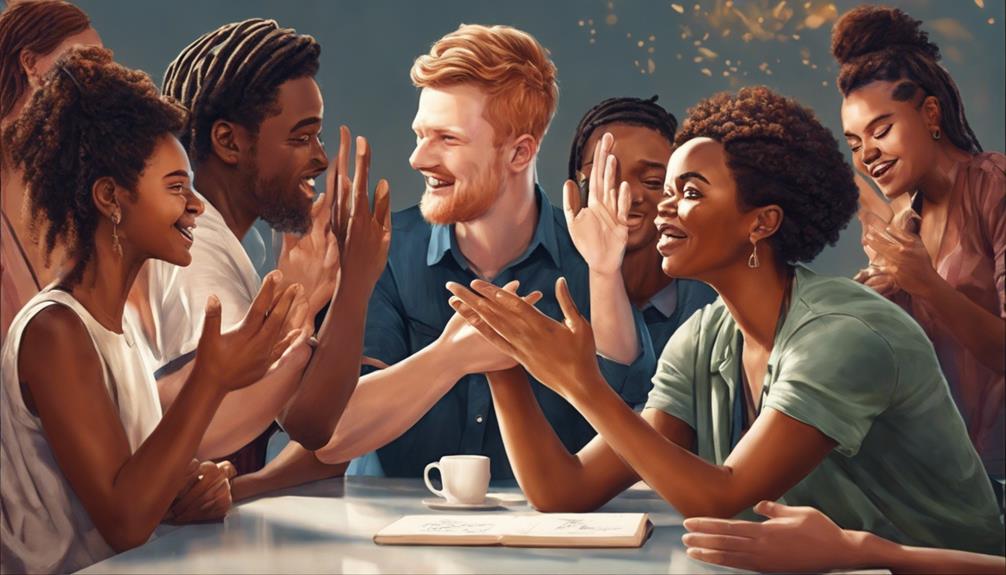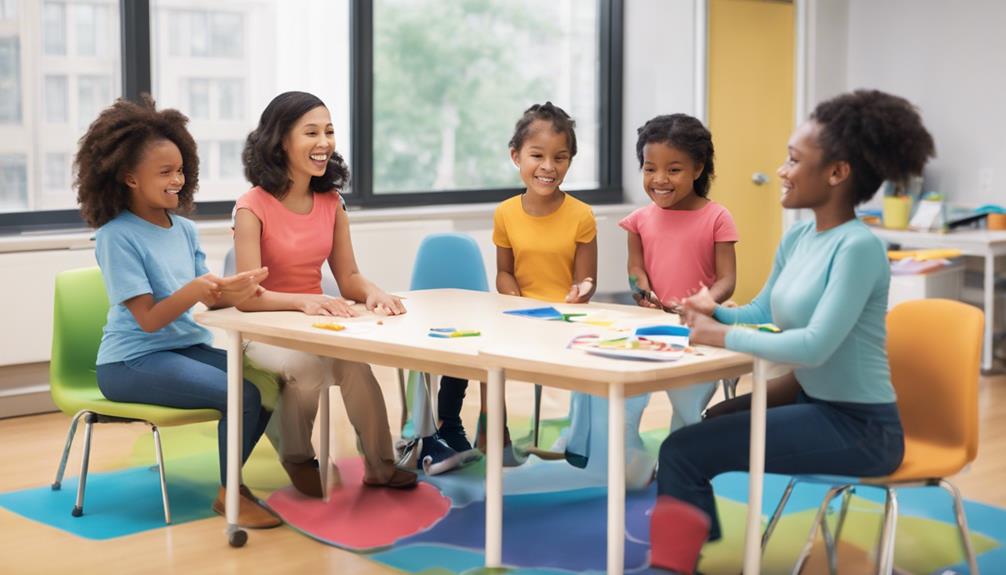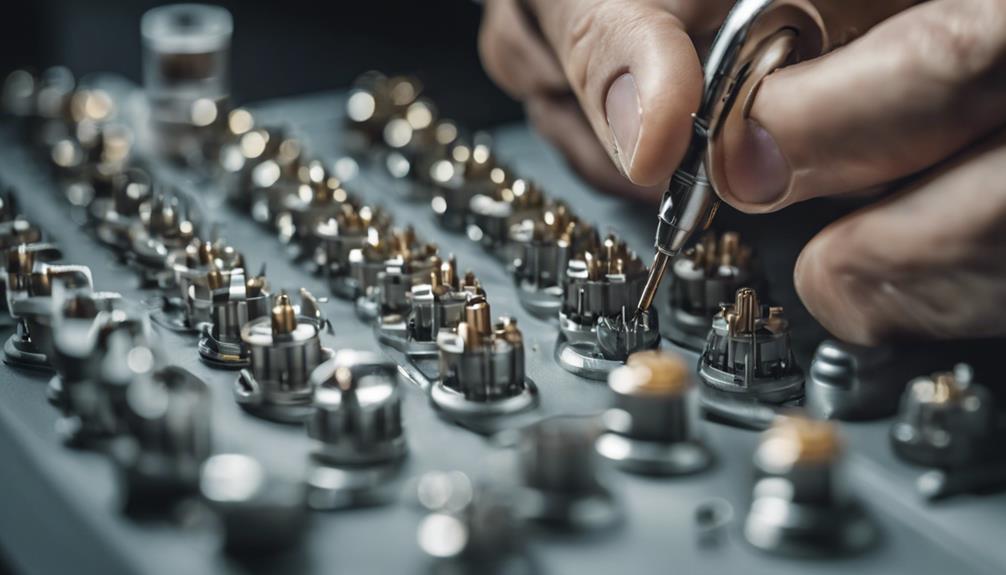When it comes to building relationships in the deaf community, we have discovered that initiating the first interaction can often result in lasting and fulfilling connections.
By exploring various avenues of engagement tailored to the deaf community, such as online platforms and community events, one can uncover a wealth of opportunities to connect with like-minded individuals.
However, the journey to building lasting connections with deaf friends doesn't end there.
Stay tuned to discover practical strategies and insightful tips that can help solidify these friendships and nurture them into something truly meaningful.
Key Takeaways
- Engage in Deaf community events for connections.
- Respect communication norms and cultural values.
- Overcome barriers with patience and various strategies.
- Connect through shared activities and genuine interactions.
Benefits of Building Deaf Friendships
Building Deaf friendships offers a sense of belonging and understanding within the community. These connections go beyond mere companionship; they provide a support system that can last a lifetime. Through Deaf friendships, individuals can find a community where they feel accepted and valued, leading to personal growth and a stronger sense of identity.
One of the significant benefits of nurturing Deaf friendships is the enhancement of communication skills. Constant interaction with friends who communicate primarily through sign language can improve one's ability to express themselves effectively in this visual language. Additionally, these friendships offer unique opportunities for cultural exchange, allowing individuals to broaden their perspectives and gain a deeper understanding of Deaf culture.
Moreover, Deaf friendships can foster personal growth by increasing empathy and understanding. Sharing experiences with friends who navigate the world through a different lens can lead to a more profound appreciation of diversity and a stronger sense of community. In essence, building and maintaining Deaf friendships can be a catalyst for positive change and enrichment in one's life.
Understanding Deaf Culture for Friendship
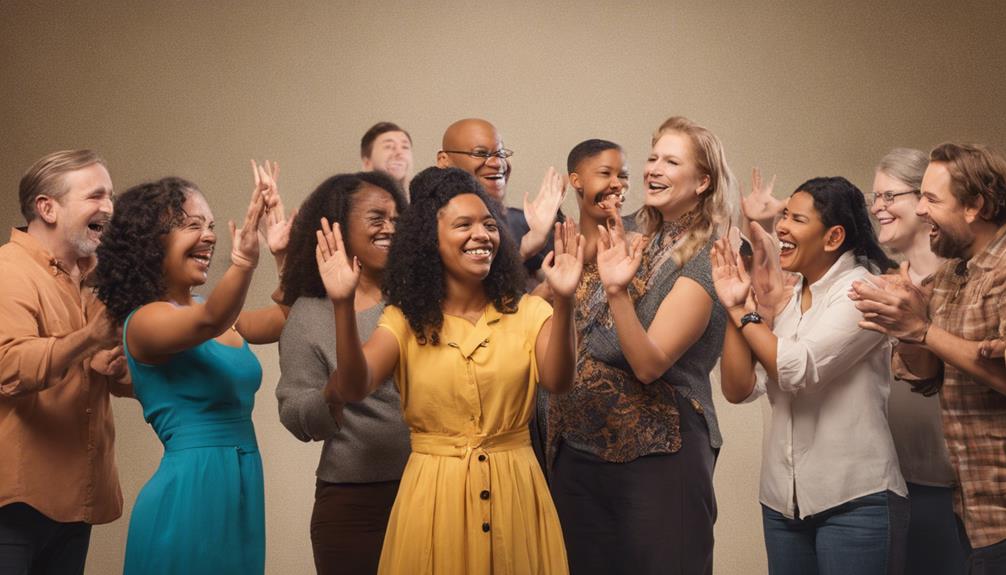
Exploring the nuances of Deaf culture is essential for cultivating meaningful friendships within the community. To better understand Deaf culture for friendship, consider the following:
- Communication Norms: Respecting the unique communication norms of the Deaf community, such as the use of sign language and visual cues, is crucial for effective interaction and building trust with Deaf friends.
- Name Signs: Recognizing the significance of name signs is vital in Deaf culture as they represent an individual's identity. Learning about and using name signs appropriately demonstrates respect and interest in the culture.
- Cultural Values: Embracing Deaf cultural values like strong community support and involvement can deepen connections with Deaf individuals. Participating in community events, gatherings, and activities can provide opportunities to engage with Deaf culture and foster lasting friendships.
Understanding and appreciating these aspects of Deaf culture can't only enrich your interactions with Deaf friends but also contribute to building strong and authentic relationships within the community.
Overcoming Communication Barriers With Deaf Friends
To effectively connect with Deaf friends, understanding and utilizing various communication strategies is key to overcoming potential barriers in interactions. Learning basic sign language gestures can significantly facilitate communication with Deaf friends. Additionally, incorporating visual aids and writing tools can enhance understanding during conversations, helping to bridge communication barriers effectively. It's important to be patient and attentive, as this demonstrates respect and can lead to smoother interactions with Deaf individuals. Seeking feedback and clarification on communication preferences directly from Deaf friends can also promote more effective dialogue and understanding.
Exploring alternative communication methods such as text messages or video calls can further support ongoing connections with Deaf friends, ensuring that communication remains consistent and accessible. By being open to trying new ways of communicating and adapting to the preferences of Deaf individuals, building lasting connections can be achieved, enriching relationships and fostering mutual understanding.
Activities to Connect With Deaf Individuals
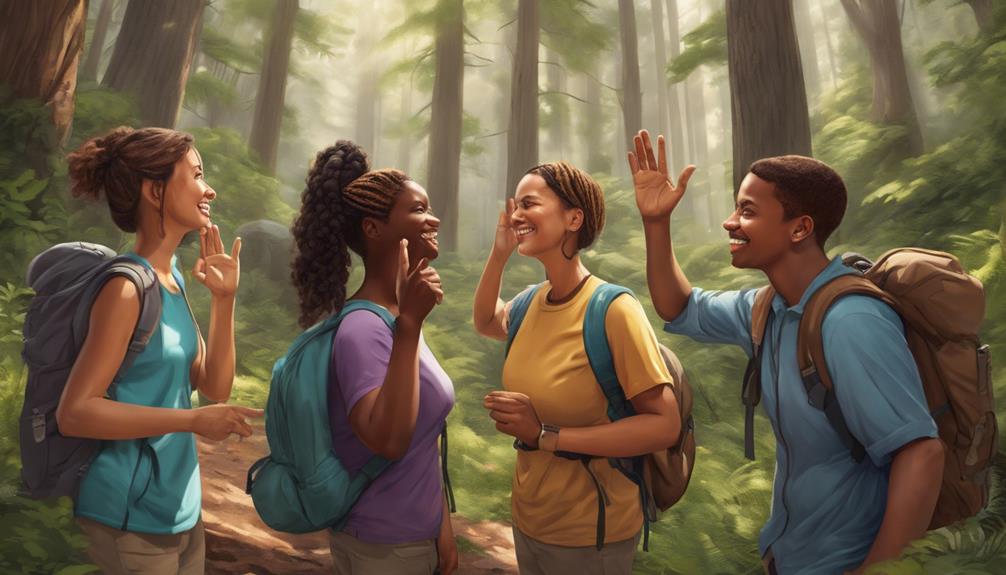
Let's explore ways to engage with the deaf community through social events that foster bonding and shared hobbies that facilitate connections.
By participating in activities like signing suppers or cultural functions, we can create meaningful relationships and learn more about deaf culture.
These engagements provide opportunities to build lasting connections with deaf individuals and establish strong friendships based on shared interests.
Social Events for Bonding
Attending Deaf social events offers a valuable opportunity to bond with others in the community and establish meaningful connections. These events provide a platform for socializing, meeting new people, and fostering a sense of belonging within the Deaf community.
To connect with Deaf individuals and build lasting relationships, consider engaging in the following activities:
- Deaf Night Out: Participate in social gatherings specifically tailored for the Deaf community, offering a fun and inclusive environment for making new friends.
- ASL Socials: Attend American Sign Language (ASL) social events to practice signing, interact with others using ASL, and strengthen communication skills while forming bonds.
- Online Networking: Explore virtual platforms dedicated to the Deaf community, such as online ASL groups or social media communities, to connect with individuals sharing similar interests and experiences.
Shared Hobbies for Connection
Engaging in shared hobbies such as ASL classes, Deaf sports leagues, or art workshops can provide opportunities to connect with Deaf individuals who have similar interests. Joining Deaf book clubs, hiking groups, or cooking classes offers chances to meet new Deaf friends while enjoying shared hobbies. Attending Deaf cultural events like film festivals, theater performances, or poetry slams fosters connections with individuals passionate about Deaf culture. Participating in Deaf gaming nights, outdoor adventures such as camping or kayaking, or dance classes tailored for the Deaf community can lead to lasting friendships. Exploring Deaf-friendly social gatherings like coffee meetups, picnics, or game nights provides a relaxed environment to bond with Deaf peers over common activities.
| Shared Hobbies | Activities to Connect With Deaf Individuals |
|---|---|
| ASL classes | Learn sign language together |
| Deaf sports leagues | Play sports with the Deaf community |
| Art workshops | Express creativity alongside Deaf peers |
| Deaf cultural events | Immerse in Deaf culture events |
Finding Deaf Community Events Near You
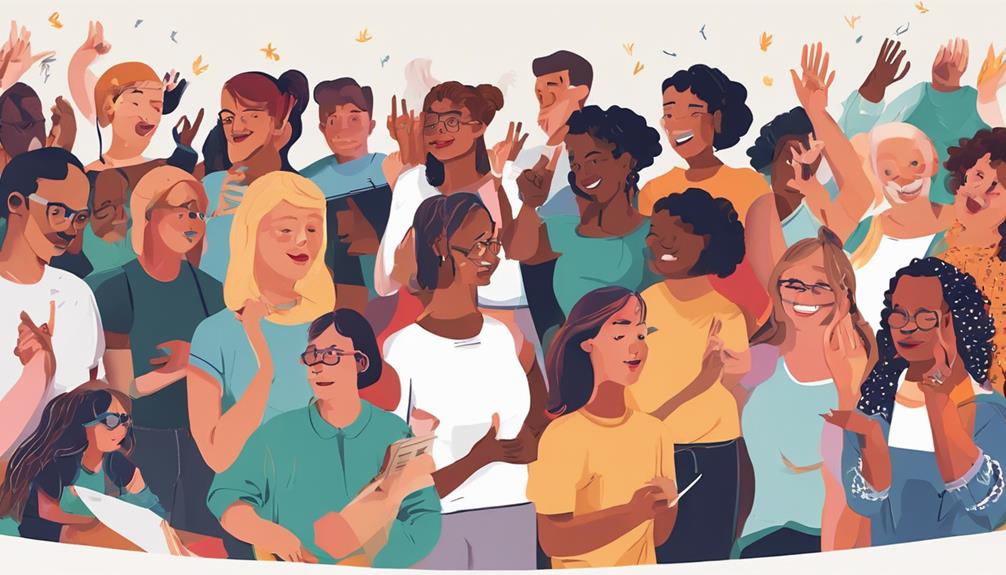
We can easily discover local Deaf community events by checking out Deaf meetups or browsing online event calendars.
These platforms provide opportunities to connect with others who share our experiences and interests.
Attending these events can lead to meaningful connections and friendships within the Deaf community.
Local Deaf Meetups
Local deaf meetups in your area provide a valuable opportunity to connect with the deaf community in person. If you're looking to engage with local deaf events, consider the following:
- State Associations: State deaf associations often organize gatherings and events for deaf individuals, offering a chance to socialize and network within the community.
- School Events: Schools for the deaf frequently host local events aimed at promoting community engagement and fostering social interactions among deaf individuals.
- Cultural Functions: Attending signing suppers and cultural functions can be a great way to expand your social circle within the deaf community, while also immersing yourself in deaf culture and traditions.
Online Event Calendars
Navigating online event calendars can be a convenient way to discover upcoming deaf community events near you. These platforms provide a centralized hub for finding a variety of social gatherings, workshops, and cultural events tailored for the Deaf community.
With features to filter events by location, date, and activity type, users can easily pinpoint relevant opportunities to socialize and connect with others using ASL. Detailed event descriptions, timings, and registration information make planning and participation straightforward.
Volunteering Opportunities in the Deaf Community
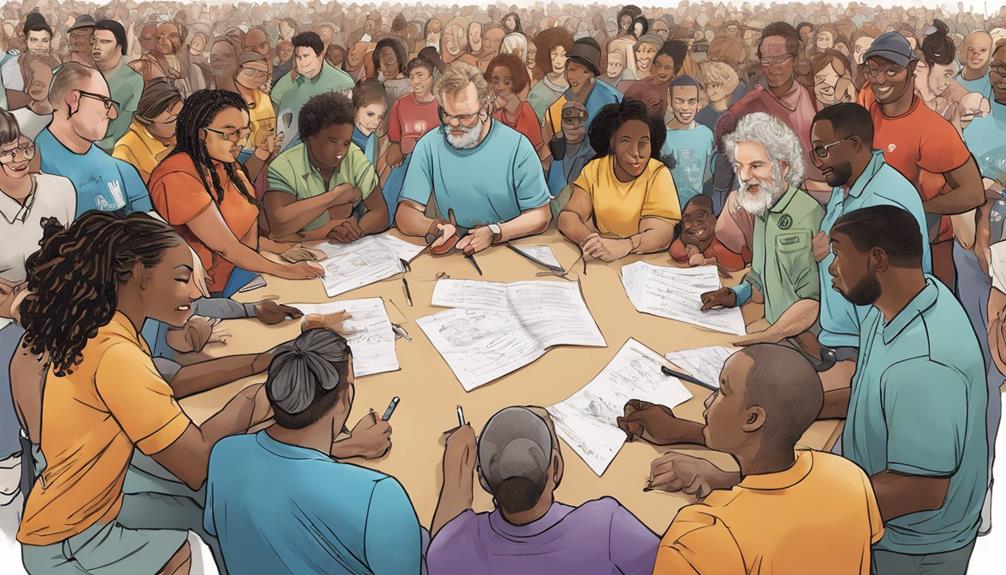
Exploring volunteering opportunities within the Deaf community offers a chance to connect, learn, and build relationships that can be both rewarding and impactful. Volunteering in organizations supporting the Deaf community not only fosters connections and understanding but also allows individuals to contribute meaningfully to a community in need.
Deaf schools often provide volunteer opportunities for involvement, creating spaces where lasting connections can be formed through shared experiences. Additionally, state deaf associations organize events that present opportunities for volunteering, leading to the chance of meeting new Deaf friends and expanding one's social circle within the community.
Key Points:
- Structured Engagement: Volunteering in ASL classes or events provides a structured way to interact with the Deaf community, enhancing communication skills and cultural understanding.
- Community Involvement: Engaging in volunteer work within the Deaf community can lead to the establishment of long-lasting friendships and meaningful connections.
- Personal Growth: Volunteering offers a platform for personal growth, empathy development, and a deeper appreciation for the Deaf culture.
Online Platforms for Meeting Deaf Friends
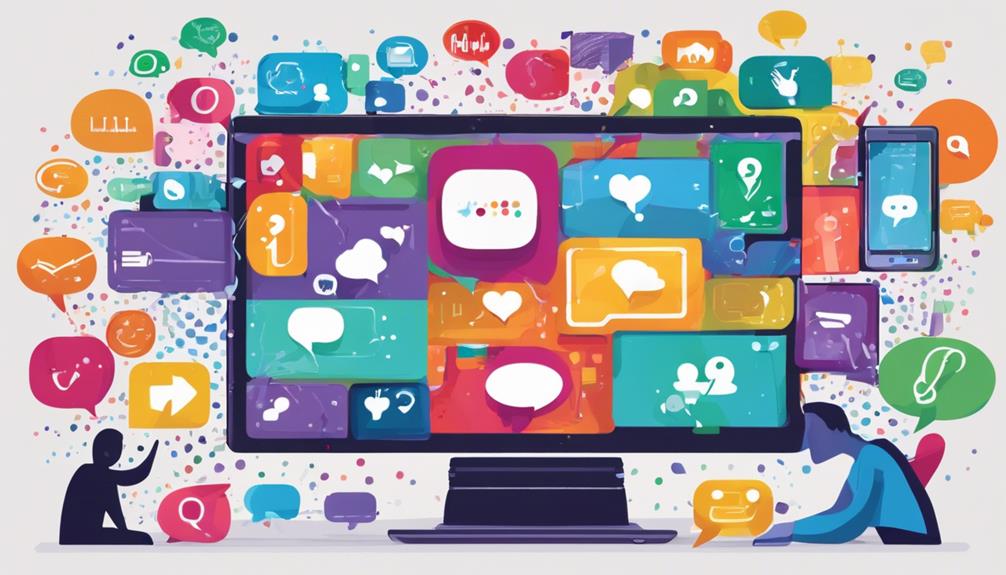
Online platforms such as Deafs.com and Deaf Singles Meet offer opportunities to connect with deaf individuals for friendships and relationships. These platforms provide a space for individuals in the deaf community to interact, fostering connections that can lead to lasting friendships or even romantic relationships. Features like real-time chat and detailed user profiles enhance the online experience, making it easier to find like-minded individuals.
For those specifically interested in dating, sites like Deaf Dating Zone and Kiss of Deaf cater to a global community of deaf, hard of hearing, and ASL singles seeking long-term relationships or marriage. Deaf Match is another option for deaf, ASL users, and hearing-impaired individuals looking for various connections, from friendships to romance. These platforms not only facilitate interactions but also help create a sense of community among individuals who may otherwise struggle to find like-minded peers in their daily lives.
Whether you're looking for friendship, love, or simply a supportive community, these online platforms can be valuable resources for meeting deaf friends and building meaningful relationships.
Tips for Being a Supportive Friend to Deaf Individuals

To be a supportive friend to deaf individuals, it's important to actively listen and show genuine interest in their experiences. Understanding and respecting Deaf culture, including communication norms and preferences, is crucial in building a strong and supportive relationship. Here are three key tips for being a supportive friend to Deaf individuals:
- Respect Communication Preferences: Be open to using various communication methods such as ASL interpreters, Social ASL, or written notes based on the preference of your Deaf friend. Respect their choice of communication to ensure effective interaction.
- Offer Assistance Thoughtfully: Offer your help and support when needed, but always ask first and respect their independence. Being considerate of their preferences and needs shows that you value their autonomy and strengthens your bond.
- Educate Yourself: Take the time to learn about Deaf culture, language, and the challenges faced by Deaf and Hard of Hearing people. By educating yourself, you show that you're invested in understanding their world and building an inclusive friendship.
Common Mistakes to Avoid When Building Deaf Friendships
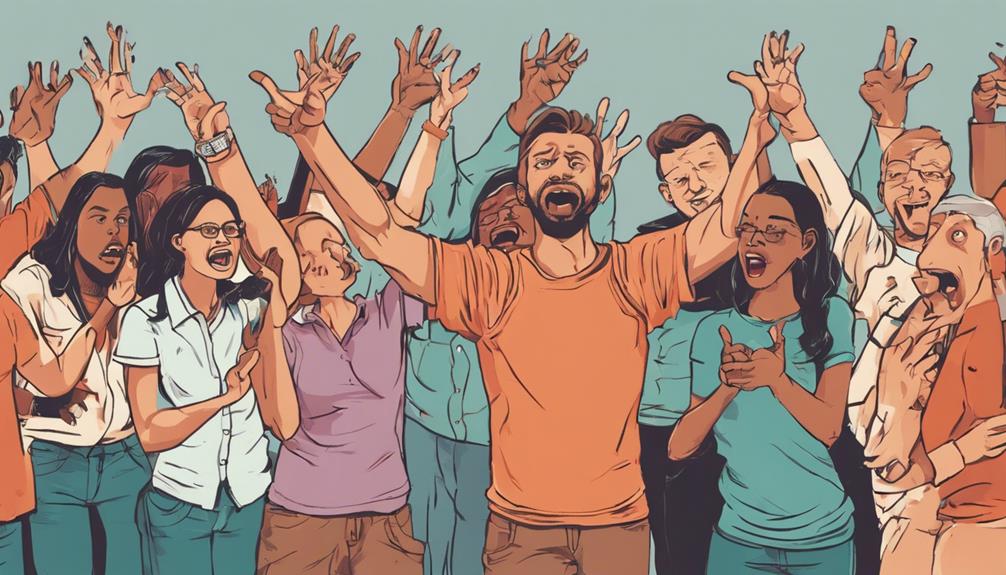
When building Deaf friendships, we should avoid assuming capabilities or preferences, shouting, or interrupting during communication.
It's crucial not to treat all Deaf individuals the same or disregard the significance of Deaf culture in fostering connections.
Building Trust Through Communication
When striving to build trust through communication with Deaf friends, it's crucial to avoid common mistakes that can hinder the development of strong and lasting connections.
- Respect Communication Preferences: Understand that Deaf individuals have diverse communication methods, so it's essential to inquire about their preferences.
- Avoid Condescension: Speaking loudly or slowly can come across as patronizing, so maintain a normal tone and pace.
- Allow Uninterrupted Communication: Interrupting a Deaf person while they're signing disrupts the interaction flow, so be patient and attentive.
Embracing Deaf Culture
Embracing Deaf culture requires a genuine understanding of its nuances and complexities to foster meaningful connections and friendships. When interacting with Deaf individuals, it's crucial to respect their communication methods, which may include sign language, lip-reading, or speech. Avoid over-exaggerating facial expressions or body language, as it can be distracting. Remember that eye contact plays a vital role in communication for many Deaf individuals. Interrupting a Deaf person while they are signing or speaking shows a lack of respect and disrupts the flow of communication. It's important not to view Deaf individuals as disabled; instead, recognize them as part of a vibrant and resilient culture with its own language and community.
| Common Mistakes to Avoid | Tips for Building Deaf Friendships |
|---|---|
| Assuming one communication method fits all | Respect individual preferences |
| Over-exaggerating facial expressions | Keep expressions clear and natural |
| Disregarding the importance of eye contact | Maintain respectful eye contact |
| Interrupting a Deaf person while communicating | Wait for natural pauses to respond |
Celebrating Diversity in Deaf Friendships
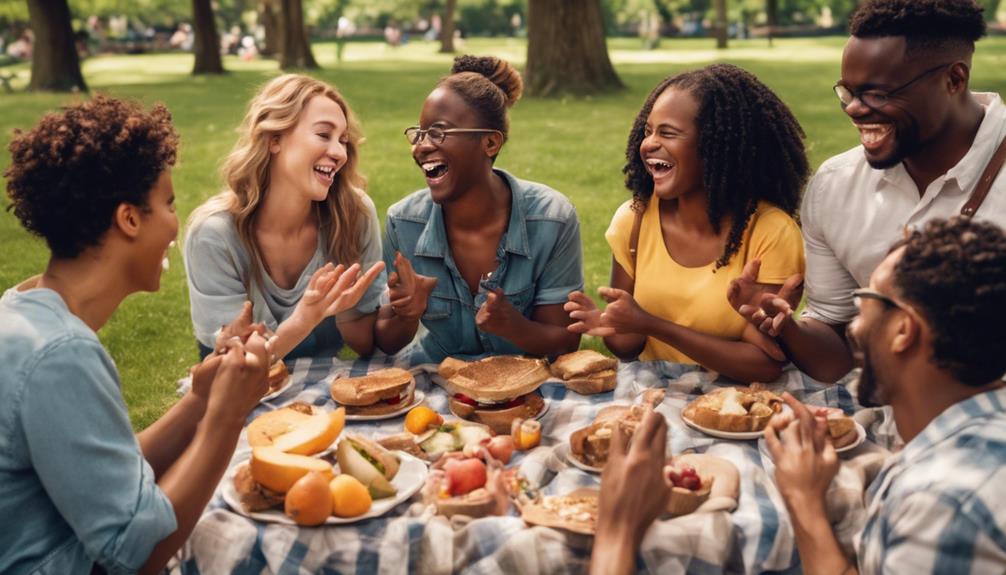
Celebrating the diverse backgrounds and perspectives present in Deaf friendships enhances the richness and depth of these connections. In the Deaf community, friendships are formed among individuals with varying identities, including Deaf, hard of hearing, and American Sign Language (ASL) users.
To truly celebrate diversity in Deaf friendships, consider the following:
- Shared Experiences: Acknowledge the unique experiences that each individual brings to the friendship, as these diverse perspectives contribute to a deeper understanding and appreciation of one another.
- Cultural Identities: Embrace the different cultural identities within the Deaf community, recognizing the richness that comes from learning about and respecting each other's cultural backgrounds.
- Communication Methods: Explore the various communication methods used within Deaf friendships, such as ASL, lip-reading, or written communication, to foster inclusive and effective interactions.
Sustaining Long-Term Connections With Deaf Friends

To maintain lasting connections with deaf friends, consistent communication and active participation in shared activities are essential. Regularly reaching out through text, video calls, or in-person conversations helps strengthen bonds and show your commitment to the relationship.
Attending deaf community events together provides opportunities to create new memories, deepen understanding of each other's experiences, and foster a sense of belonging within the community. Offering support, showing empathy, and being understanding of the unique challenges faced by deaf individuals can go a long way in sustaining long-term connections.
Active listening, respect for deaf culture, and a willingness to learn and practice sign language demonstrate your dedication to the friendship. By putting in consistent effort, showing mutual respect, and sharing meaningful experiences, you can play a vital role in building and preserving relationships with deaf friends over time.
Frequently Asked Questions
How Can You Make Connections With Deaf People?
To make connections with deaf people, we should engage in deaf community events, join online groups, volunteer at deaf organizations, learn ASL, and participate in cultural activities.
How Do I Meet Deaf Friends?
We meet deaf friends by actively engaging in deaf community events, joining local social groups, or attending workshops.
Building connections involves genuine interaction and participation in deaf cultural activities.
It's essential to seek out opportunities to connect with like-minded individuals and immerse ourselves in the deaf community.
What Are 4 Strategies Deaf People Might Use to Communicate With You?
Deaf individuals might use sign language, lip-reading, writing, or gestures to communicate with us effectively. Understanding their communication preferences and being open to various methods can foster better connections.
How Do You Engage With Deaf People?
Engaging with deaf individuals involves focusing on visual cues like facial expressions and body language. Direct communication is key, avoiding reliance solely on interpreters.
It's important to respect their independence by offering help only when requested. Deaf individuals rely on expressions for communication, so it's best to speak naturally and avoid exaggerated body language.
These strategies foster meaningful connections and understanding between us and our deaf friends.
Conclusion
In conclusion, building lasting connections with deaf friends can be a rewarding and fulfilling experience.
By understanding deaf culture, overcoming communication barriers, and actively participating in activities and events within the deaf community, you can create meaningful relationships that stand the test of time.
Embracing diversity, being a supportive friend, and celebrating the unique perspectives of deaf individuals will ultimately enrich your life and deepen your connections with others.

